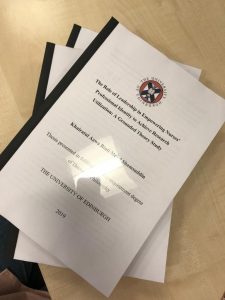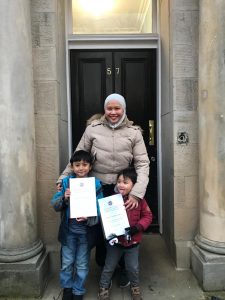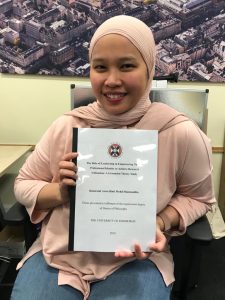I once heard a story about a PhD student who had been to a war zone, telling other PhD students that she was more scared of her Viva at the end of her PhD than she was of being exposed to war.
 This is a story that stayed with me. Not because it made me believe that the Viva is worse than war (I am sure that she simply said this to express how nervous she was when the time came to defend her PhD). I think it was the way we pass on these kinds of stories and how we rarely talk about what actually happens once you have reached that point in your PhD career.
This is a story that stayed with me. Not because it made me believe that the Viva is worse than war (I am sure that she simply said this to express how nervous she was when the time came to defend her PhD). I think it was the way we pass on these kinds of stories and how we rarely talk about what actually happens once you have reached that point in your PhD career.
For this reason, I decided to contact former PhD students and staff members of the School of Health in Social Science to interview them about their experiences and thoughts on submitting a PhD thesis and preparing for a Viva. These experiences are real, but they also illustrate that the whole process is very personal. Some advice will be applicable to all students, some might be more specific to the subject area or the individual person.
My first interviewee is Azwa Shamsuddin, soon to be officially Dr Shamsuddin, who passed her Viva in early March 2020. Azwa did her PhD in Nursing Studies on leadership for nursing research utilization. For the interview, we met via Skype (due to the current social distancing measures), interrupted only once by one of her sons, who gave her a quick hug before we returned to the interview. Azwa laughed and said: “[…] it can be hard to work from home […] but I have a very supportive work environment”. Life doesn’t stop while we are working on our PhDs and this is one of the reasons why the finished thesis will never be perfect. Azwa herself is the mother of two young sons moved house right before her Viva and looked for jobs while still being a student. She is proud of her work, but she can also put it into perspective. Looking back, she says this is the best she could do, but it will never be flawless.
“I really learned throughout this whole thing that you have to own your decisions!”
This is the main message I took home from my interview with Azwa. It might not be the easiest task, but it is definitely something I had been confronted with already. The support of supervisors is essential and helps you grow as a researcher, but your thesis is your own piece of work. The Viva is only the last hurdle of a marathon and we make many decisions throughout our PhDs. During the Viva, you get the chance to justify these decisions, without being defensive.
What you need to know, if you are in a hurry:
- Important information about the Viva can be found on the PGR Learn space! There is a lot of information in a folder called
“Submission and Viva Information” (in “Essential Information”) - Have a look at the book “Stepping stones to achieving your doctorate: Focusing on your viva from the start” by Trafford & Leshem (2008). This might help you prepare yourself from the very start of your PhD!
- If you are close to submitting and your supervisors haven’t already organized it for you, ask them about a mock Viva! Additionally, ask other students to organize one as well and try to make it challenging for yourself
- Discuss with your supervisors the best time to have it. Maybe you are able to organize it before you submit, so you can make changes to your thesis if you need to
- If possible, think about inviting more than one staff member to your mock viva
- Proofread your thesis but accept to find some typos after submission. This is not the end of the world; examiners expect some typos!
- Let the school know as early as possible if you are unavailable for your Viva on certain days! They will organize a time and place with your examiners; you will be informed via email
- Prepare yourself for your Viva by knowing your thesis inside out! Be prepared to talk about the references you refer to in your thesis
- If you would like them to be there, invite your supervisors to attend your Viva. But it is absolutely up to you!
If you are interested, here is the full interview with Azwa:

I: Thank you again for letting me interview you about your PhD experiences! So, how long would you say did it take you to write your whole thesis?
A: I would say the whole journey, three and a half years I spent writing. With like the literature review during the first year and preparing the first-year review document. There was some methodology, but most of my methodology chapter was written while I was doing data collection. So, I was doing data collection and analysis for a whole year and doing this all while writing the methodology chapter as well. […] So yeah, I had a whole chapter on methodology and [one on] analysis, which I wrote for a whole year doing data collection and analysis. And then the findings and discussion chapter took about a year, a year and a half. That was towards the end. So yeah, I think you do have to start writing from the beginning. Throughout the whole PhD journey, don’t stop writing! I think it will help you loads towards the end.
I: That’s really good to know! So, it is not really a linear process, is it?
A: No, definitely not! […] Like when I was writing up my findings, I was still in an analytical process and I was finding myself updating the analysis chapter. Once I was done with data collection, the methodology chapter didn’t really change much. Except for little edits. […] [However,] when you are writing, you are analysing as well. So, it’s definitely not linear. I would say, nothing about a PhD is linear [laughs]!
I: That is definitely true [laughs]. Did you follow a specific structure?
A: No, with the structure…I got this as a correction for my Viva as well. I do think qualitative research is really different, it is really difficult to decide what kind of structure to follow for your thesis, at least I think, and I read a few theses to see what kind of structures I’d like for my own. That helped! I really learned throughout this whole thing that you have to own your decisions! […] Because when you are in the Viva, you need to defend your decisions [laughs]. You need to decide, and you need to know why you did things because in the Viva you might be asked about it. And this is true for your whole PhD. So, I would say there is no prescribed structure, just look at as many theses as possible. Of course, I think in qualitative research it is very subjective and your examiners will have the final say [laughs].
I: When you used references, did you have a specific tool that helped you throughout the process?
A: I used both Endnote and Mendeley but I think both, unfortunately, tended to crash, especially on the university computers. And so, towards the end, especially towards the findings and discussion chapters, I did most of my references manually. I copy-pasted formatted references from Google Scholar [laughs]. I put it into chapter documents, so I knew which references go where, alphabetize them and then just deleted the duplicates in the end. […] And then you have to double-check the references towards the end. And still, no matter how much you double-check, there will be typos! There will be, there will be! But don’t be too hung up on it! Because none of my corrections were on typos. I was really anxious because when I went through my thesis after I submitted (after I submitted, I gave myself two weeks off and then when I went back to read it), I was horrified to find quite a few typos! Even one whole paragraph that shouldn’t be there [laughs]. But they didn’t even mention it in my corrections. I think they expect some typos, which is fine, so not to worry about it.
I: So, we are always told that the thesis doesn’t need to be perfect, but how did you feel about your thesis right before you submitted it?
A: Well of course, when you spent years doing it, you want it to be the best it can be! Well, I thought when I submitted, I felt it was the best I could do at that time, under those circumstances. […] I think when you look back you understand at what kind of frame of mind you were at that time. So, I think, at that time it was the best I could do under the circumstances. Cause I was looking for jobs and stuff. But I still dreaded reading my thesis again before the Viva [laughs]. But I know many people felt the same, so I think if you feel that, it is normal! But then, once you go through it, you know I was like: “Oh, this is not too bad!” [laughs]. And, I proofread my thesis twice before submitting it and I can say, there is just no perfect thesis. And even if you do come back with no corrections, there will be some discussions on some points and it is just whether or not your examiners decide [you have] to correct that, based on how you defend it. So, there is no perfect thesis, but I would say focus more on methodology and why you did things. I think, if you can justify what you did, you don’t have to worry too much whether or not your thesis is perfect.
I: Yes, it is like you said, it is still an achievement! You put so much time and effort into it! So…was there anything you did not know about the process of submitting your thesis, that you would recommend other students to prepare for?
A: Nah, I think it was pretty standard. It was all on the LEARN site, the PGR LEARN site, yeah. Also, you can just email Alison and then she will get back to you, but it is pretty standard! It is just, I don’t know if anyone knew this, but I brought my kids and my husband all to submit the thesis and the PGR office, I mean the exam office, they were really supportive of it. So, you know, just tell other people if they want to [bring your family], just go ahead, they are really supportive!
I: That is really nice!
A: Yeah, I felt like I owed it to them! [laughs] I spent so much time and really, I think, the whole family is involved in the PhD, because it’s just something that takes so long, and it takes over your life and they are part of your life. Especially for people with kids and stuff, I think, well if you want to you should [bring them along]!
I: So, when it came to your Viva after you’ve submitted, how was it organized or scheduled? Did you have a say regarding time and place…?
A: No, I didn’t have a say… I just got an email from Alison, saying that she had arranged it all and I was notified by email. I didn’t even know that you were supposed to invite your supervisors! They didn’t ask me if I wanted them there! So, I didn’t ask them and I didn’t know how to go about it. But I was told during my mock Viva, I asked – and I think this is a good thing about mock Vivas, that you have an external person to ask these things. And to like make the Viva process a bit more transparent. And she was the one who told me that it was me, I was supposed to invite my supervisors [laughs]. But yeah, it was pretty straight-forward, I didn’t have a say about time and place, but I suppose if you have any issues with that, you can let Alison know. Let them know before they decide when to do it!
I: That is a good point! So, in the end, were your supervisors there for your Viva?
A: Yeah, they were both there! I was so glad they were there [laughs]. I think it was just really reassuring. Before the Viva, I got to sit with them and have a chat with them… And even the few days leading up to the Viva, I had a meeting with my supervisors, and I think they were very supportive before and during and we met up half an hour before the Viva. We talked about lots of things, we didn’t really talk about the Viva or the thesis, I think they were trying to make it feel very informal. I am just really glad that they were there and I guess it depends on what kind of relationship you have with your supervisors, so I was just very lucky and, if you have a good relationship with them, I don’t see why you shouldn’t have them there.
I: Where did you have your Viva, was it in the School of Health in Social Science?
A: I had it in Buccleuch Place. Yeah, it was just opposite from my office.
I: How did you prepare for the Viva?
A: I would recommend because I was recommended a book, which is called […] “Stepping Stones to Achieving your Doctorate” and I think the whole premise of this book is that you prepare for the Viva from the beginning of your thesis, and not after you submit your thesis. And I think, it really makes sense! You are supposed to prepare for your Viva from the very beginning. And then you’ll have a much better time at your Viva! So, I think I prepared throughout my PhD for the Viva by reading this book, well whenever I could, […] but the actual tips itself for the day of the Viva is not much. But the tips throughout were just really good in how you prepare for your Viva, so I really do recommend that book! And also, in terms of presentations, there was something in that book about presentations and like presentations are quite contentious in Vivas. It is not something that is conventional. There was like six-point they highlighted, if you wanted to do a presentation, these six points you have to keep in mind but also if it is worth doing a presentation… I did this poll on the PGR Facebook page […] to see who had done a presentation at their Viva, regardless of their outcome, everyone voted that they didn’t do a presentation. Even the ones I knew passed without corrections. So, I am like, that’s a pretty good indicator that you don’t need to do a presentation. Also, this was something that I asked my supervisors if they think I should do a presentation and their question was: “What value does this add to your thesis that you haven’t already said in your thesis?”. So, I think if it is just a repetition of your thesis, it is just going to give you a bad start to your Viva, so really think about that, but for me, I didn’t do a presentation.
I: Before your Viva, did you look up your examiners?
A: Oh yes! Of course, I did! I stalked them [laughs]. And also, make sure that you cite them and if they’ve published any books, read them! Definitely look up your examiners. Read what they have written, but don’t read too much into them […]! That is my advice. Read the materials that they have published, but don’t try to think about what kind of questions will come up, that is not helpful [laughs].
I: But did you prepare some questions before the Viva?
A: Yes. I went through like the top 40 Viva questions… I think it was helpful in giving me some confidence before the Viva because you tend to be quite anxious before and it gives you a bit of a confidence. But I think, what really gave me confidence was before I looked up the questions, I went through my thesis again, cover to cover, and then I did chapter summaries for each chapter and for the summaries I highlighted what the five most important points were. And then I went through the references if there are any references that I couldn’t remember, just to go through the abstract, just to refresh. And after doing the chapter by chapter summary, I went through the top 40 questions and I felt that was helpful in building my confidence. But I have to say, not many of the questions came up during the actual Viva [laughs]. So, I don’t know, I don’t think it was helpful for during the Viva, but I think it was certainly helpful in me stopping myself in being too anxious about the Viva.
I: And you mentioned before that you’ve had a mock Viva. Was that helpful?
A: Ahm… yeah, it was helpful in terms of making the process of the Viva more transparent. But I think it is tricky, I would recommend for you to have at least two staff members for a mock Viva, but I don’t think you have much say in how your mock Viva is organized. […] But definitely, if it is possible – if I could go back, I would say: “Can we invite another person and have it a bit more challenging?”. So that you challenge yourself a bit more than in the actual Viva. I think that would be good. And if you find the mock Viva hard, I think it is actually a good sign. Because then you are more prepared for the actual thing.
I: So, was it your initiative, the mock Viva, or were your supervisors involved?
A: No, my supervisors asked me if I wanted a mock Viva and then I said “yes” and then they decided on who is going to do it. It was one
person and then I set it up with her. And then it was just asking when you want to do it, either closer to your Viva date or do you want it a few weeks before? And I asked for a few weeks before, because I wanted some time to prepare. But I think definitely if you can get two people to do it with you and to really challenge you during the mock, I think it would be really helpful.
I: Yeah, I think that it is a really good recommendation. Did you do a mock Viva with peers, like with other students?
A: No, I didn’t… I don’t know. I kind of regret it now. But I didn’t know. I just started work then, so I was like really busy. So, I started work mid-February and then my Viva was like early March… And then I just had no time to prepare with peers and staff. And I was also moving house back then, it was crazy [laughs].
I: That is a lot at the same time! So, was there anything you worried about or you felt insecure about before your Viva?
A: Yeah! I mean, before the Viva […] I just had this assumption that [my internal examiner] will give me really tough questions, because I know what kind of amazing scholar she is, and that was not the case at all in the Viva! She asked some really interesting questions, but she was overall very supportive of me. So, I don’t think you should have assumptions about people, coming into the Viva, if someone is going to give you a tough time, or not. I know it is difficult to not have assumptions, but I think if you do have assumptions, the ideal is to just put that aside […]. I think that period of time really taught me a lot about having expectations because I was so anxious about so many things. But none of them panned out. So, I was just worrying myself. […] So, try not to worry about that. Because most likely those assumptions…it is just your worries.
I: All in all, how did your Viva go? How long was it?
A: I would say […], about two hours. I had a fifteen minutes break before I came back for the decision, for the outcome. The whole thing was led by the external examiner. And there was a particular focus on his subject area, because that was his interest, whereas my internal one was more on the methodology-side, she didn’t ask me a lot about methodology […]. I mean, she did ask a few, but they were like really, I think, straight-forward questions.
I: And what kind of questions were asked? You already started talking about this…
A: Oh yeah, there was a particular focus on the subject area, not so much on the methodology. I was surprised, and very grateful of course [laughs]. There was some disagreement on the structure of the thesis, but just as I said, it is really subjective, and you just have to own the decisions you make. I wouldn’t say there was like standard questions. As I said, I went through the top 40 questions and really none of them really came… I mean a couple questions came in towards the end […], but it was more of a like ‘let’s get through this’ […] [laughs]. Yeah, I don’t think you can expect anything with the Viva, but just come in knowing that you know your thesis and why you have done things. I think, [then] you’ll be fine.
I: Okay [laughs], that is good to know! So, you already said that you were out for fifteen minutes and then, did you wait outside of the room?
A: No, we went to my supervisor’s office, just across from where we were for the Viva and we had some tea. […] She brought cake you know [laughs], we had cake and tea and I almost burst into tears, but I didn’t [laughs]. And it was just so… I don’t know. People tell me it’s more of a discussion, but I don’t know. I found I was quite anxious, but they told me that I did better than I thought… So, I was out fifteen or twenty minutes and then we were invited back in. And they were very clear, you know, that they would recommend that I will be awarded with my PhD pending corrections and then they listed the corrections, it was like five, and how long I had to make the corrections. And actually, you do get a say on how long you want to submit your corrections after. Well, they asked me if this was enough, they gave me twelve months and then I said I think I can do it in six months and then they said they wanted to give me twelve months because I was working. But then, looking at the list of corrections I said I could do it in six, so then they changed it to six. But then do know that the final recommendation that they make to college […], you can’t change that. So, when you say, I’ll take six months, then it is six months, you can’t extend it.
I: That is very helpful to know! So, just in general, were there any classes or courses that you attended to prepare yourself?
A: Yeah, I did! What’s that… Viva Survivor?! Yeah, but I think I took that really early on, like second year, and then when the time came, I really couldn’t remember anything [laughs]. It is the same as I said before, I don’t think you prepare for the Viva itself; I think the whole PhD process is supposed to prepare you for the Viva. […]. So, I think it is just to keep in mind that, you’ve done this, you’ve gone through it and you know it, so… I think preparing yourself for the Viva is mostly knowing your thesis cover to cover and knowing why you did things. But yeah, I did go to a couple of courses, but I don’t think they helped me tremendously because when the time came, I couldn’t remember anything [laughs].
I: Was it an IAD course?
A: Yes! And I know someone else who went to the same course and I would recommend if you want to go, go closer to it! But probably before you submit your thesis. And also in the book I recommended, they do recommend that you have your mock Viva before you actually submit so that if you get some questions that require you to change your thesis you can actually do it before you submit. But really, this is something you can discuss with your supervisor towards the end before you submit. I didn’t have this discussion and now that I think back, it would have been a good thing to do.
I: So, all in all, is there anything you would recommend students to think about now, even if there is still like a few years until they will submit their thesis?
A: You prepare your Viva in preparing for the thesis, so in essence, you are preparing for your Viva from the start. So just know it cover to cover and think about why you did things the way you did. And also, I think, to not be afraid to defend and justify your thesis. […] During your Viva, don’t be defensive, but if they say things that you know you have written, just point it out!
I: Finally, are there any key skills that you think are necessarily for passing the Viva? You have already said, it is basically the whole process, the Viva is just the last steppingstone…
A: I feel like it is similar to going through an interview… In a way, you have to know how to relate to people, but also to be able to reason and defend why you did things. I think that is really important.






